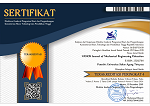IMPROVING LEARNING ACTIVITIES AND LEARNING OUTCOMES USING THE DISCOVERY LEARNING METHOD
Abstract
This research is action research conducted in two cycles. Each cycle consists of planning, action, observation, and reflection. This research aims to improve the quality of the learning process. The Discovery learning method is used to improve the quality of learning. Stages of learning discovery methods consist of simulations, problem statements, data collection, verification, and generalization. Student learning activities are measured using an observation sheet. Student learning outcomes are measured using achievement tests in the form of multiple-choice questions. Data obtained in the study were analyzed using descriptive analysis. Data obtained from observations and achievement tests are used as a basis for improvement in the next cycle. The results of this study, discovery learning methods can improve learning activities and student learning outcomes. In the first cycle, students in the very active and active category were 63% and increased in the second cycle to 97%. In the first cycle, mastery learning reached 69% and increased in the second cycle to 87%.
Keywords
Full Text:
PDFReferences
Billett, Stephen. (2011). Vocational education: Purposes, traditions, and prospects. New York: Springer.
Clark, Linda & Winch, Cristopher (ed). (2007). Vocational education. New York: Routledge.
Dalyono. (2015). Psikologi pendidikan. Jakarta: Rineka Cipta.
Denzin, N. K., & Lincoln, Y. S. (2007). Strategies of qualitative inquiry (3rd ed.). Thousand Oaks: Sage.
Dimyati & Mudjiono. (2013). Belajar dan pembelajaran. Jakarta: PT Rineka Cipta, departemen Pendidkan Dan Kebudayaan RI.
Hamid Darmadi. (2015). Desain dan implementasi penelitian tindakan kelas (PTK). Bandung: Alfabeta.
Hanafiah & Cucu Suhana. (2012). Konsep strategi pembelajaran. Bandung: Refika Aditama.
Maclean, R & Wilson, D. N. (2009). International handbook of education for the changing world of work bridging academic and vocational learning. New York: Springer Science & Business Media B.V.
Mettler, Richard. (1998). Cognitive learning theory and cane travel instruction a new paradigm. Nebraska: State of Nebraska, Departement of Public Institutions, Division of Rehabilitations Service for The Visually Impaired.
Muhibbin Syah. (2014). Psikologi pendidikan dengan pendekatan baru. Bandung: Remaja Rosdakarya.
Pavlova, M. (2009). Technology and vocational education for sustainable development-empowering individual for the future. New York: Springer Science & Business Media B.V.
Piaget, J. (1973). To understand is to invent. New York: Grossman.
Republik Indonesia. (2013). Undang-Undang RI Nomor 20 Tahun 2003, tentang Sistem Pendidikan Nasional.
Schunk, D. H. (2012). Teori-teori pembelajaran: Perspektif pendidikan. (Terjemahan Erika Setyowati). New York: Pearson Education. (Buku asli diterbitkan tahun 2012)
Suharsimi Arikunto. (2008). Penelitian tindakan kelas. Jakarta: Bumi Aksar.
Wina Sanjaya. (2012). Strategi pembelajaran berorientasi standar proses pendidikan. Jakarta: Kencana.
DOI: http://dx.doi.org/10.30870/vanos.v5i1.8221
Refbacks
- There are currently no refbacks.

This work is licensed under a Creative Commons Attribution 4.0 International License.


.png)
.png)
